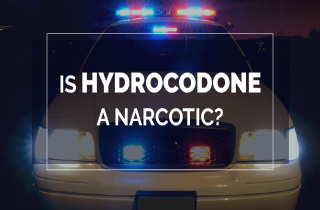Yes.
Hydrocodone is both a narcotic by law and by medicinal use. But is hydrocodone addictive ? And how do you know that you’re addicted? We make a short review of the legal and pharmaceutical definitions of what makes hydrocodone a narcotic below. Plus, we invite you to ask your questions about hydrocodone at the end.
What is a narcotic by medical definition?
By medical definition, narcotics are substances used to treat moderate to severe pain. In fact, the word “narcotic” is taken from the Greek word for “stupor”. So, narcotic originally referred to substances that dull the senses and relieve pain.
In today’s medical context, narcotics are also described as substances which bind to opioid receptors in the central nervous system. As such, narcotics act on cellular membrane proteins in similar ways that heroin or morphine do. Primary effects of narcotics include pain relief and euphoric effect. However, narcotics are used therapeutically to treat pain, suppress cough, alleviate diarrhea, and induce anesthesia.
What is a narcotic by legal definition?
Some people refer to any illicit substance as a narcotic. The term “narcotic drug” is legally defined by the Controlled Substances Act in the U.S. since its enactment in 1970. In this way, the term “narcotic” becomes much more broad and can include drugs produced directly or indirectly by extraction from substances of vegetable origin, or independently by means of chemical synthesis, or by a combination of extraction and chemical synthesis. The main compounds defined as narcotics in the U.S. include:
- Opium, opiates, derivatives of opium and opiates, including their isomers, esters, ethers, salts, and salts of isomers, esters, ethers (but not the isoquinoline alkaloids of opium), poppy straw and concentrate of poppy straw
- Coca leaves, cocaine, its salts, optical and geometric isomers, and salts of isomers and ecgonine, its derivatives, their salts, isomers, and salts of isomers.
- Any compound, mixture, or preparation which contains any quantity of any of the substances referred to above.
Hydrocodone as a narcotic
Hydrocodone is both a narcotic in medical terms and legal terms. The following definitions outline the medical and legal definitions of hydrocodone as a narcotic.
1. Medical narcotic – Hydrocodone bitartrate is an opioid analgesic and antitussive (cough suppressant).
2. Legal narcotic – Hydrocodone is a Schedule II narcotic, a classification of the Controlled Substances Act.
Why is hydrocodone a Schedule II drug?
Legally, hydrocodone is classified as a Schedule II drug under the Controlled Substances Act. All drugs in this Schedule require a doctor’s prescription (non-refillable) for medical use. Furthermore, Schedule II drugs are relatively addictive. Hydrocodone falls into this schedule because it currently accepted medical use in treatment in the United States. Additionally, hydrocodone has a high potential for abuse which may lead to severe psychological or physical dependence.
Hydrocodone is also marketed in multi-ingredient Schedule III drugs which have accepted medical use in treatment and moderate to low physical dependence or high psychological dependence. But these drugs are often combined with other ingredients such as acetaminophen or ibuprofen to reduce abuse potential. So in some ways, the drugs in Schedule III which contain hydrocodone are more safe than hydrocodone alone.
Is hydrocodone addictive?
Yes, hydrocodone is very addictive. Even if you are taking hydrocodone as prescribed, you will need medical help and supervision when you decide to stop taking the pain medication. During this time, expect to go through a withdrawal period, as your body adapts to the chemical imbalance or lack of hydrocodone in the central nervous system. How long is hydrocodone withdrawal? Symptoms generally peak 3 days after you stop, but can continue for days or weeks as your body stops chemical dependence. When hydrocodone is out of your body, you will then know if you are addicted or not. Addicts experience intense drug cravings and often return to hydrocodone use to avoid psychological or emotional discomfort even though the body has been detoxified.
Questions about hydrocodone
Please leave us your questions about hydrocodone and its use below. We respond to all questions with a personal answer. And if you’re interested in other topics about hydrocodone, feel free to comment below or to send us an email. We look forward to hearing from you.









Related Posts